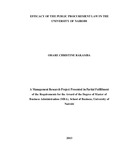| dc.description.abstract | The objective of this study was to assess the efficacy of the Public Procurement Law in the University of Nairobi. The specific objectives were to determine organizational factors that affect effective implementation of the Procurement law in the UoN; to determine the effect of UoN’s procurement process on conformance to the Procurement law and to determine the efficacy of the procurement law in UoN. The study adopted a case study approach. The respondents were selected through purposive sampling from different UoN procurement departments. Data was collected through an interviewer administered questionnaire. The data collected was analyzed using SPSS and the findings were presented in tables, graphs and pie charts. The study targeted a sample of
32 respondents out of which 26 gave responses to the questionnaire giving a response rate
of 81%. The study established that the principal organizational factors that affect procurement processes are; structure and role clarity, procurement plans, authorization process, types of goods and service procured and competency of procurement personnel. Quality of feedback and procurement techniques was found to be influential in PPDA compliance in UoN. On processes, the study observed that the UoN procurement processes are clear with clear reporting lines and channels of communication. The procurement law has improved the level of transparency in procurement and the quality of goods and services delivered by suppliers. The greatest weakness of the procurement law is that it has reduced the speed of procuring goods and services at UoN. In assessing the efficacy of the procurement law in UoN, the study established that PPDA had improved the competitiveness of the procurement processes in UoN, improved the quality of goods and services delivered, increased transparency in procurement and finally it promoted ethical standards among UoN procurement staff. These outcomes have strengthened the degree of compliance to the Procurement Law and conformance to the PPDA objectives. One weakness that the study observed is that PPDA has slowed down the procurement process due to the bureaucracy involved thus leading to low effectiveness. In conclusion, the findings from UoN may to a large extent confirm that the procurement processes and practices in UoN conform to the PPDA objectives hence there is high efficacy of the procurement law in UoN. | en |

